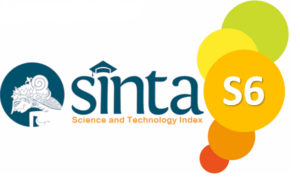PENGARUH KEPEMIMPINAN TERHADAP KINERJA KARYAWAN PADA PT. WIN ACCES TELECOMMUNICATION PALEMBANG DENGAN KEPUASAN KERJA SEBAGAI VARIABEL INTERVENING
DOI:
https://doi.org/10.5281/zenodo.3952886Abstract
This research aims to find out how much leadership impact on employee performance in PT. Win Acces Telecommunication Palembang with the satisfaction of working as a variable intervening. This research uses primary and secondary data. The population of the research is all employees of PT. Win Acces Telecommunication Palembang, sampling techniques using census samples with a sample number of 46 respondents. Data analysis techniques are quantitative by using linear regression and pathway analysis. The results showed that the leadership and work satisfaction of a partial and simultaneous effect on performance with the significance of 0.000. In a direct, leadership impact on performance is 41% while the impact of leadership on performance through the work of the intervening variable is 13%. The research also proves that job satisfaction is not proven as an intervening variable.References
Ahmad, H., Ahmad, K., & Shah, I. A. (2010). Relationship between job satisfaction, job performance attitude towards work and organizational commitment. European journal of social sciences, 18(2), 257-267.
Cardy, R., & Leonard, B. (2014). Performance Management: Concepts, Skills and Exercises: Concepts, Skills and Exercises. Routledge.
Chamundeswari, S. 2. (2013). Job satisfaction and performance of school teachers. International Journal of Academic Research in Business and Social Sciences, 3(5), 420.
Fang, C. H., Chang, S. T., & Chen, G. L. (2009, May). Applying Structural Equation Model to Study of the Relationship Model among leadership style, satisfaction, Organization commitment and Performance in hospital industry. In 2009 International Conference on E-Business and Information System Security.
Lawler III, E. E., & Boudreau, J. W. (2015). Global trends in human resource management: A twenty-year analysis. Stanford University Press.
Mitonga-Monga, J., Coetzee, M., & Cilliers, F. V. N. (2012). Perceived leadership style and employee participation in a manufacturing company in the democratic republic of Congo. African journal of business management, 6(15), 5389-5398.
Motowidlo, S. J. (2003). Job performance. In W. C. Borman, D. R. Ilgen, R. J. Klimoski (Eds.), Handbook of psychology, Vol. 12: Handbook of industrial and organizational psychology (pp. 39-53). New York: Wiley.
Nanjundeswaraswamy, T. S., and D. R. Swamy. "Leadership styles." Advances in management 7, no. 2 (2014): 57.
Obasan, K.A. (2011). “Evaluating the impact of training and development on organisational productivity: evidence from nigeriaâ€. prime journal of business administration and management.2(1)
Oladipo, K. S., Jamilah, O., Abduldaud, S., Jeffery, L. D., & Salami, D. K. (2013). Review of leadership theories and Organizational performances. International Business Management Journal, 7(1), 50-54.
Omolayo, B. (2007). Effect of leadership style on job-related tension and psychological sense of community in work organizations: A case study of four organizations in Lagos State, Nigeria. Bangladesh e-Journal of Sociology, 4(2), 30-37.
Rashidpoor, M. (2000). The study of relationship between organisational commitment and job performance in counting organization. m.sc. thesis tehran university, Iran.
Robbins, S. P., & Judge, T. A. (2008). Perilaku organisasi edisi ke-12. Jakarta: Salemba Empat, 11.
Stentz, J. E., Clark, V. L. P., & Matkin, G. S. (2012). Applying mixed methods to leadership research: A review of current practices. The leadership quarterly, 23(6), 1173-1183.
Wibowo, M. K. (2016). edisi ke 3, Jakarta: PT. Raja Grafindo.
Cardy, R., & Leonard, B. (2014). Performance Management: Concepts, Skills and Exercises: Concepts, Skills and Exercises. Routledge.
Chamundeswari, S. 2. (2013). Job satisfaction and performance of school teachers. International Journal of Academic Research in Business and Social Sciences, 3(5), 420.
Fang, C. H., Chang, S. T., & Chen, G. L. (2009, May). Applying Structural Equation Model to Study of the Relationship Model among leadership style, satisfaction, Organization commitment and Performance in hospital industry. In 2009 International Conference on E-Business and Information System Security.
Lawler III, E. E., & Boudreau, J. W. (2015). Global trends in human resource management: A twenty-year analysis. Stanford University Press.
Mitonga-Monga, J., Coetzee, M., & Cilliers, F. V. N. (2012). Perceived leadership style and employee participation in a manufacturing company in the democratic republic of Congo. African journal of business management, 6(15), 5389-5398.
Motowidlo, S. J. (2003). Job performance. In W. C. Borman, D. R. Ilgen, R. J. Klimoski (Eds.), Handbook of psychology, Vol. 12: Handbook of industrial and organizational psychology (pp. 39-53). New York: Wiley.
Nanjundeswaraswamy, T. S., and D. R. Swamy. "Leadership styles." Advances in management 7, no. 2 (2014): 57.
Obasan, K.A. (2011). “Evaluating the impact of training and development on organisational productivity: evidence from nigeriaâ€. prime journal of business administration and management.2(1)
Oladipo, K. S., Jamilah, O., Abduldaud, S., Jeffery, L. D., & Salami, D. K. (2013). Review of leadership theories and Organizational performances. International Business Management Journal, 7(1), 50-54.
Omolayo, B. (2007). Effect of leadership style on job-related tension and psychological sense of community in work organizations: A case study of four organizations in Lagos State, Nigeria. Bangladesh e-Journal of Sociology, 4(2), 30-37.
Rashidpoor, M. (2000). The study of relationship between organisational commitment and job performance in counting organization. m.sc. thesis tehran university, Iran.
Robbins, S. P., & Judge, T. A. (2008). Perilaku organisasi edisi ke-12. Jakarta: Salemba Empat, 11.
Stentz, J. E., Clark, V. L. P., & Matkin, G. S. (2012). Applying mixed methods to leadership research: A review of current practices. The leadership quarterly, 23(6), 1173-1183.
Wibowo, M. K. (2016). edisi ke 3, Jakarta: PT. Raja Grafindo.
Downloads
Published
2020-07-19
How to Cite
Hasni, P., Noviantoro, D., & Septianti, D. (2020). PENGARUH KEPEMIMPINAN TERHADAP KINERJA KARYAWAN PADA PT. WIN ACCES TELECOMMUNICATION PALEMBANG DENGAN KEPUASAN KERJA SEBAGAI VARIABEL INTERVENING. Jurnal Aplikasi Manajemen Dan Bisnis, 1(1), 27–35. https://doi.org/10.5281/zenodo.3952886
Issue
Section
Articles
License
Authors who publish with this journal agree to the following terms:
- Authors retain copyright and grant the journal right of first publication with the work simultaneously licensed under Creative Commons Attribution 4.0 International License that allows others to share the work with an acknowledgment of the work's authorship and initial publication in this journal.
- Authors are able to enter into separate, additional contractual arrangements for the non-exclusive distribution of the journal's published version of the work (e.g., post it to an institutional repository or publish it in a book), with an acknowledgment of its initial publication in this journal.
- Authors are permitted and encouraged to post their work online (e.g., in institutional repositories or on their website) prior to and during the submission process, as it can lead to productive exchanges, as well as earlier and greater citation of published work (Refer to The Effect of Open Access).










1.png)
